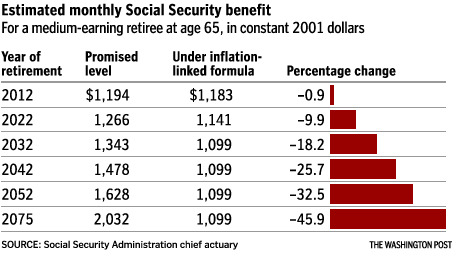Well, nothing new there -- the memo simply confirms the George W. Bush administration's proposal to change "the formula that sets initial Social Security benefit levels, cutting promised benefits by nearly a third in the coming decades, according to several Republicans close to the White House" (emphasis added, Jonathan Weisman and Mike Allen, "Social Security Formula Weighed: Bush Plan Likely to Cut Initial Benefits," Washington Post, January 4, 2005, p. A1).
What's the Bush formula?
Under the proposal, the first-year benefits for retirees would be calculated using inflation rates rather than the rise in wages over a worker's lifetime. Because wages tend to rise considerably faster than inflation, the new formula would stunt the growth of benefits, slowly at first but more quickly by the middle of the century. . . .If that doesn't sound bad enough, take a look at "Table 2. First-Year Annual Benefits for the Median Retired Worker If Benefits Are Claimed at Age 65, by Birth Cohort and Earnings Level" of the Congressional Budget Office's "Long-Term Analysis of Plan 2 of the President's Commission to Strengthen Social Security" (September 30, 2004). Compare the figures in the "Current Law -- Trust-Fund-Financed Benefits" column (which represent what retirees will receive if the government does nothing at all to raise funds to pay out scheduled benefits, such as raising the ceiling on taxable wages or giving the trust fund an infusion from general revenues) and those in the "CSSS Plan 2 -- Proposed Benefits + 1A" column (which show what retirees will receive if Bush gets to "reform" Social Security). Notice that retirees in all categories -- from lowest-earning to highest-earning households -- will fare worse under the Bush plan than under the so-called "bankrupt" trust fund?
. . . . . . . . . . . . . . . . . . . .
According to the Social Security Administration's chief actuary, a middle-class worker retiring in 2022 would see guaranteed benefits cut by 9.9 percent. By 2042, average monthly benefits for middle- and high-income workers would fall by more than a quarter. A retiree in 2075 would receive 54 percent of the benefit now promised.

. . . . . . . . . . . . . . . . . . . .
. . . Social Security benefits currently equal 42 percent of the earnings of an average worker retiring at 65. Under the new formula, that benefit would fall to 20 percent of pre-retirement earnings. (emphasis added, Weisman and Allen, January 4, 2005)
In case you don't, Max Sawicky, an economist at the Economic Policy Institute, spells it out for you in CAPITAL LETTERS: "Suffer the Children" (MaxSpeak, January 4, 2005).
By proposing big cuts, not just partial privatization, Bush in effect challenged us: "Bring them on!" By all means, let's bring them on.




No comments:
Post a Comment